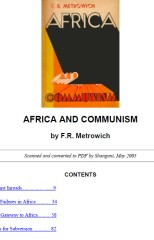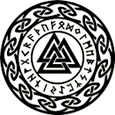
Author : Metrowich F. R.
Title : Africa and communism
Year : 1967
Link download : Metrowich_F_R_-_Africa_and_communism.zip
Communist inroads. The Communist threat to the Free World would, if one were to judge by the mass indoctrination by news media dominated by United States propagandists, appear to have been concentrated in the 1960's on South-East Asia, notably Vietnam, and the Western Hemisphere, notably Cuba. And yet, International Communism has launched its most intensive and diabolical campaign in the present decade on the continent of Africa, where a stream of less-developed nations have burst onto the world scene as sovereign independent states. The Western world has reacted to this campaign in Africa either by turning a blind eye or by making preposterous excuses on behalf of emergent African states and seeking to cover up Communist inroads. Regrettably so, for it is in Africa that the millions have most needed the inspiration and guidance of the Free World in confronting the wiles and deceit of Communism. This reaction of the West can be traced, by and large, to the guilt complex of the European, or former colonial, powers and the isolationist attitude of the United States. The European powers - Britain, France and Belgium - have failed dismally in preparing the people of Black Africa for life in the modern, 20th Century. Confronted with the failure of colonial rule, these powers have panicked and rushed the peoples of Black Africa into premature independence with the result that Africa has been exposed to the full fury of Communist onslaughts. The European powers' unscrambling of their links with Africa could not have dove-tailed more neatly with the plans of International Communism. The European powers have sought to ease their guilt complex by turning their backs on the harsh realities of the situation or trumpeting profuse apologies for the Black African. The United States' reaction has been to retreat hastily in the face of the fact of Communist infiltration of Africa, and leave the continent to its fate while building bridges against Communism nearer home. The American attitude is epitomised in the statement by G. Mennen Williams, the American Liberal politician, when he retired at the end of his inglorious period as U.S. Secretary of State for African Affairs with the boastful assertion that "particularly noteworthy" of his stay at the State Department had been the "fact" that "not a single Communist satellite has emerged in Africa and that Communist efforts at dominating African countries have been curtailed". The statement is naive and not strictly correct. It is true that there is not a single state in Africa to-day that is Communist in the sense that East Germany or North Vietnam are Communist states. Russia and China have no satellites in Africa as they have in Europe and Asia. But bland acceptance of this fact would be misleading and would certainly not give the West any cause for complacency, because in Africa, a development has occurred that is equally disturbing to the development of Communist satellite states in Europe and Asia. In Africa, there has been the development of Communist stooge states. A Communist stooge state in Africa can be defined as one in which policies are followed that actively promote the cause of International Communism. This active promotion is to be found in two avenues: firstly, the pursuance of internal policies that have led to totalitarian rule and intense socialism to the extent that a climate has been created that could, and in most cases inevitably must, lead to establishment of a Communist state unless there is a dramatic check on current directions; secondly, the pursuance of policies that are preparing the soil for Communism and are exporting the seeds of Communism to the soils of African countries elsewhere on the continent. Some of the stooge states in Africa conform to the first classification, some to the second, and most of them to both. As will be seen in subsequent chapters, countries in Africa that had become Communist stooge states by the beginning of 1967 were Algeria, Burundi, Congo-Brazzaville, Egypt, Guinea, Mali, Somalia, the Sudan and Tanzania. For International Communism, these nine stooge states represent a valuable asset in the ideological and propaganda warfare that is commonly termed the "Cold War" but is, in reality, a war in which, in Africa, much heat is engendered. The success of International Communism in gaining nine stooge states in Africa by the beginning of 1967 is near spectacular if two factors are borne in mind. The first is that Communism has made its gains in a comparatively short period of time. Although the first Communist Party in an African state was formed in 1921, in South Africa, it was not until after World War II that Russia began turning her attention to Africa, Communist activity up to then having been sporadic in Africa. In the first half of the 1950's, Communist concentration in Africa was largely confined to North Africa and it was only in the late 1950's, mostly in the early 1960's, that Russia started turning on the pressure in Africa south of the Sahara. Communist China's first steps in Africa came in 1956. The development of nine Communist stooge states within the space of 10 years certainly does not bear out Mennen Williams' bland statements. The second factor that must be borne in mind is that in contrast to the Communist "revolutions" in Europe, nationalism has been a powerful political force in the "revolutions" in Africa. Black African leaders who have gained power have not easily relished the thought of sacrificing their nationalism for Communism. Kremlin Communists and African Marxists have therefore compromised to the extent that the Marxists have not been expected to become Communists openly. This compromise fits in with the general trend in the development of International Communism as presented to the outside world, namely a tendency to split into groupings of states rather than to perpetuate the monolithic Communist concept of a world-wide movement in which all the components owe prime loyalty to Russia. To what extent there has been a split in Communist ranks and to what extent satellite states will be prepared to follow policies other than those prescribed by the Kremlin is open to debate, but certainly the image presented to the outside world is one of a Communist world in which members do not have to conform too rigidly to a common policy. In the light of this, it has not been necessary for African Marxists to declare themselves openly Communist. International Communism can reap the fruits of their political affiliations without such a declaration. (It should be stressed that, at the same time, the aim of a world revolution remains common policy to all Communists.) The emergence of nine Communist stooge states out of 40 independent states in Africa may not be an impressive number. But it is by no means a poor start for the Communists. Furthermore, as will be detailed in subsequent chapters, Communism has been active throughout the continent to such an extent that in the remaining 31 states, only a handful can be regarded as completely secure from the threat of Communism. South Africa and Rhodesia are at this stage the only countries on the continent which have certainty of repelling Communism except in the event of a Communist-backed United Nations operation or other international intervention. Portugal's African provinces can possibly fall into this category if Lisbon displays sufficient resoluteness; and so, too, can one or two of the smaller states that are wholly dependent on Western nations for their economical survival. But in most of the 31 states that are not stooge states at the present time, conditions are such that none can feel safe if exposed to a sudden Communist challenge. The inroads made by Communism in Africa, therefore, have been deep. One other, extremely important, matter deserves mention. Those in the Western world who oppose Communism do not do so merely because it is a political ideology opposed to Democracy. Indeed an acceptable alternative ideology to Democracy would probably be a good thing. Communism is not opposed simply because it is "different" to Western ideologies, but because of the depravity and bestiality of the systems produced by implementation of Marxism-Leninism. It is opposed because millions of people are subjected to tyranny and slavery. Even if one were to accept at face value Mennen Williams' statement that there are no Communist states in Africa, the tyranny of government and the depravity of life in many African states ruled by Black leaders who claim to be "non-aligned" politically are not far removed from conditions pertaining in Communist states. The thousands of Black men* butchered by Kenyatta's infamous Mau Mau terrorists and the thousands murdered by Khruschev, the "Hangman of the Ukraine" all met the same fate at the hands of men who were bent on a common goal - imposition of the will of their master. Indeed the satanic nature of the bestial oaths taken by the Mau Mau - gouge out eyes and drink the liquid from them, burn children alive, hack off the feet of captives, etc. etc. - were, if anything, on a far crueler scale than the crimes committed by Khruschev's henchmen in the Ukraine. The tactics adopted by the Black Communists in the Congo and the tactics adopted by the Russian Communists to suppress the Hungarian revolt differed only in shades of intensity. If anything, the atrocities committed by the Congolese and Black United Nations troops - repeated raping of women, mutilation of children, acts of lust against nuns - were more shameful than even the brutal mowing down of defenceless people by Russian tanks in Budapest. Nkrumah's secret police did not murder as many innocents as Lenin's Cheka or Stalin's thugs, but it is doubtful whether they showed any greater morality in the execution of Comrade Nkrumah's whims than did those working under Comrade Lenin and Comrade Stalin. At least Beria, for instance, died quickly - the highly-respected Dr. J. B. Danquah, for one, died a lingering, painful and tortorous death in a Ghanaian prison. ...

Davis James Kirkpatrick - Spying on America
Author : Davis James Kirkpatrick Title : Spying on America The FBI's domestic counter-intelligence...














